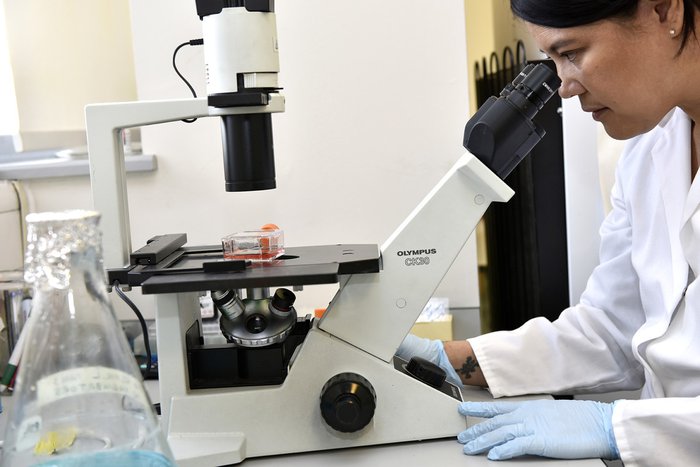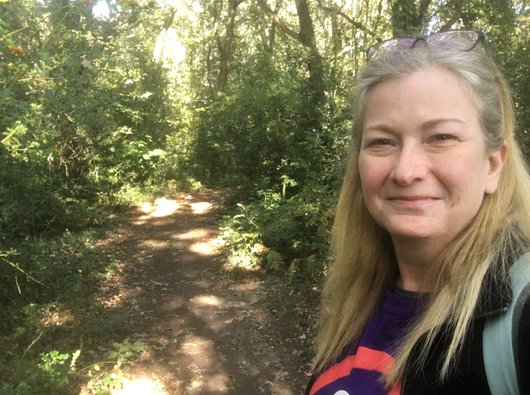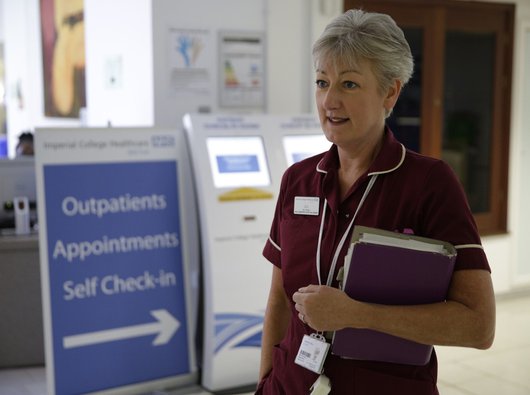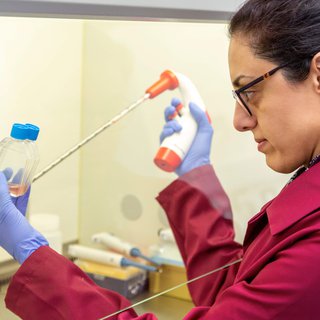How can I get involved in blood cancer research?
In November 2020, we asked our community to complete our survey and help us set our research priorities for the next five years.
Firstly, thank you to everyone who took part. We had over 200 responses, which is already being used to inform our work. This includes how we involve more people affected by blood cancer in our research processes going forward.

Here’s what you told us
One of the key findings from the survey was that 88% of respondents said they would like to be more involved in blood cancer research. Of those responses, 85% said…
“I would like to be more involved, but I’m not sure what I could do or where to start”
We asked our Ambassador, Gill Murphy, to share her insights to help you take the first step on the road to supporting future research.
Gill is a patient representative for a number of national and local research groups.
She’s seen first-hand how research, at all stages, can benefit directly from patient and carer involvement, where all members work together as a partnership.

Initially, Gill was a Research Scientist before becoming a Research Manager at the Medical Research Council and the National Institute of Health Research (NIHR) Clinical Research Networks. Gill is also a valued member of our Research Strategy Patient Panel.
How do I get involved in blood cancer research as a patient or carer?
With the advent of the coronavirus pandemic and the race to develop effective vaccines, the role of medical research and clinical trials has taken centre-stage in our daily news. As blood cancer patients or carers of those affected, we’re very familiar with the importance of research in developing better and kinder treatments.
Many blood cancer patients are involved in research as ‘participants’ in clinical trials, which can be part of their treatment. People can also donate blood or tissue samples to a CellBank / biobank (research tissue bank) for future research studies.

Contact our Clinical Trials Support Service
Get personalised support to understand which clinical trials are available - whether you're a patient, carer or healthcare professional.
You may have also completed surveys that cover your treatment and your patient experience. Of course, there are many more ways to get involved in blood cancer research aside from being on a research study or clinical trial.
“Patient and public involvement (PPI) has become a key element in many aspects of blood cancer research”
What is patient and public involvement in research?
It’s when patients, carers and members of the public are actively involved in research projects and research organisations. It’s research carried out 'with' or 'by' patients and carers, not 'to', 'about' or 'for' them.
Whether it’s identifying patient and carer priorities for research, ensuring that future patients are given clear information about a new trial, or being a patient or carer representative in a research funding panel.
There are many roles and ways that blood cancer patients and carers can share their voice to enhance and improve research.

So, how can I get started?
With Blood Cancer UK?
In May 2020, we recruited 14 people to our Research Strategy Patient Panel.
Although applications for this particular panel are now closed, we envisage getting more people involved in the future, so please do keep an eye out on our website, newsletter and twitter account.

Joining the Blood Cancer UK Policy Panel
Mat's experience with myeloma inspired him to join the Blood Cancer UK Policy Panel.
People in Research – sign up!
If you do one thing today, make sure you check out the People in Research website. This fantastic ‘matchmaking’ website is where researchers and organisations post about their opportunities for public involvement in research. It’s also a great place for patients and carers to search for research opportunities to get involved in.
Make sure you sign up for email alerts based on your interests and experiences. That way, you’ll get tailored updates when something relevant comes up. It’s a really great resource!
Get talking
Let people know that you’re interested in getting involved in research. Talk to your blood cancer doctor – even if they aren’t running blood cancer studies themselves, they may be able to refer you to their colleagues who are looking for patients or carers to get involved with a research group or share their opinions about a new study that is being developed. Similarly, speak to blood cancer charities or other patients.
Check with your local Trust or University/Institute
Some hospitals are very ‘research active’, meaning that many healthcare professionals are developing or running clinical research studies or have patient and carer research panels.
Some research active Trusts may have Biomedical Research Centres which invite patients and members of the public to get involved. If you can’t find opportunities to get involved at your local hospital, why not look further afield? There are lot of ways you can get involved via email or virtual meetings.
Research and charity organisations
Here is a list of charities and organisations that post about opportunities for patient and public involvement in research. You may want to subscribe for email updates:
Patient and Carer Panels and forums
You could find out about various research opportunities on charity forums and panels (make sure the links are from a trusted source!)
Some opportunities require a level of PPI experience, but many do not. The key thing is about sharing lived experience. You don’t have to be an ‘expert’ in research.
I really enjoy using my patient experience to contribute to research. Like many patients, I have benefitted from past research, and I find this is a truly fascinating way to be able to give back and potentially help patients in the future. Good luck, and I hope this helps you get started on your involvement journey too!

Stay updated with the latest news
Sign up to our mailing list to receive the latest news, research, and ways you can help us beat blood cancer.


